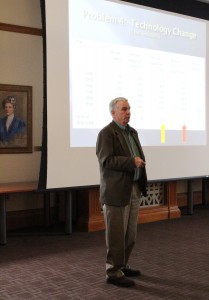Provost Emeritus and economist extraordinaire Charles Phelps returned to campus on Monday, Feb. 21, to deliver an address called “Our Own Worst Enemies: How We and Our Government Helped to Create, Exacerbate and Extend the Health Care Mess.”
Phelps has studied health care economics for nearly three decades. He recently published a book called “Eight Questions You Should Ask About Our Health Care System (Even If The Answers Make You Sick).”
During his tenure as UR provost, Phelps continued to teach within the analogous realms of public policy and health economics. In 1989, he “went across Elmwood Avenue” to serve as chairman of the Department of Community and Preventative Medicine at Strong Memorial Hospital, where he worked a great deal with health policy.
“Places like [UR] are instilled with extraordinarily interesting people,” Phelps said in a phone interview on Wednesday, Feb. 16. “You just get an opportunity to meet this enormous cross section of those interesting people as provost.”
When asked about how he spends his time now in California, ever so far from Rochester and its dreary winter weather, he answered that he was looking out at the Pacific Ocean. “Just to make you a little jealous,” he added.
During Monday’s discussion, Phelps spoke about our health care system, the economic and public health policy issues that have rendered it so inefficient and what can be done to invite progress and see a solution unfold.
As Phelps articulated, the U.S. spends more on health care than any other country, with relatively low health outcomes.
In his new book, Phelps asks and answers relevant questions about the recent history of health care, mishandled insurance and the sometimes frivolous overuse of certain medical technologies (like MRI). He has entitled his favorite chapter “Do Dollars Distort Doctors’ Decisions?” In it, Phelps writes about the extent to which financial incentives change health care providers’ choices whilst dealing with patients.
“They’re humans; they respond to economic incentives … It’s hard to find anything in our health care system that doesn’t have a distortion somewhere in the financial incentives. That’s why my bottom line message is — get the incentives right,” the chapter reads.
Phelps has also expressed concern for lifestyle choices in general, and he spoke of how smoking, obesity, lack of exercise, alcohol abuse and, to a lesser extent, sexual behavior and illicit drug use augment our national health quandary.
“Almost half of all deaths in the U.S. arise from behavioral choices… Over a third … come from smoking and obesity,” he said. Phelps also noted, with a certain degree of humor, that “the United States is about to drown in a sea of fat.” Phelps went on to discuss the fact that those suffering from obesity spend 40 percent more on health care than do people within the normal weight range.
As far as health reform is concerned, Phelps has voiced a need for massive restructuring of economic incentives, such as implementing high deductible insurance so that people are made more cognizant of true medical care costs.
He indicated frustration with the knowledge that there seem to be no incentives for people to make good lifestyle choices — insurance costs the same for a smoker as it does for a healthy nonsmoker.
Phelps noted that within the National Institute of Health there is much to be done in terms of restructuring research priorities as well.
Phelps expressed concern with the fact that most money goes towards “curing diseases we already have. Very little money goes towards preventative research; one-tenth of one percent is aimed at tobacco research,” he said. He suggests that research funds be reallocated and that more resources go towards tobacco cessation.
He advocates for education as our most invaluable tool and powerful precursor to national progress.
“Our kindergarten through 12th grade education in the United States is just awful compared to that of other countries … The more education you have, the more likely you are to embrace a healthy lifestyle,” Phelps said. “With every single lifestyle choice I’ve looked at higher education improves those choices. It’s true of smoking, of obesity and exercise, and it’s true of alcohol abuse.”
Phelps argues that highly educated people can navigate a complicated health care system more effectively, and they are adequately empowered to make smarter choices about the recommendations health care providers give them.
In a personal anecdote, Phelps explained how his grandfather had been a farmer without a formal education and that his father became a doctor. He too, has progressed in the world.
“I got a Ph.D.,” he said. “Look at the transformation from my grandfather and what he experienced to what I have experienced.”
Phelps’ story, like his book (and the subject of Monday’s discussion), attests to the importance of education as both a right not to be undervalued and a necessary facet of socioeconomic reform.
Gelbard is a member of
the class of 2013.




